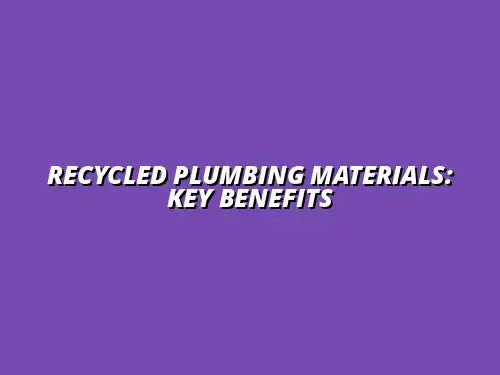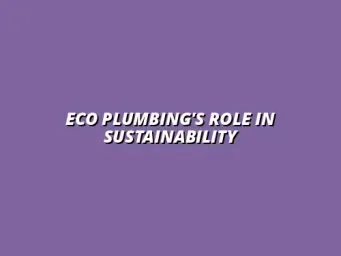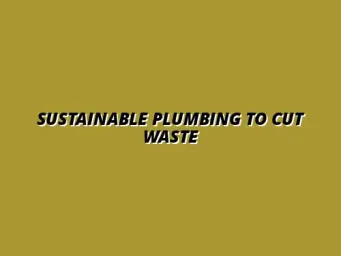Understanding Recycled Plumbing Materials and Their Importance
Recycled plumbing materials are an innovative approach in the plumbing industry that focuses on reusing and repurposing materials that would otherwise contribute to waste. By utilizing these materials, we can create a more sustainable plumbing system that significantly reduces our environmental footprint. It's essential to understand what constitutes recycled plumbing materials and why they are becoming increasingly relevant in modern construction and renovation projects. For homeowners looking to improve water efficiency, exploring water-saving tips is a great first step.
Defining Recycled Plumbing Materials
Recycled plumbing materials refer to products made from previously used materials that have undergone a process of recycling. This ensures that the materials have been treated to remove contaminants and are safe for reuse in plumbing applications. Examples include pipes, fittings, and fixtures that have been sourced from discarded plumbing systems and re-engineered for new projects.
Types of Recycled Plumbing Materials
Several types of plumbing materials can be recycled effectively. Here are some common categories:
- Plastic pipes: Often made from PVC or HDPE, these can be reprocessed to create new pipes.
- Metal fittings: Copper and brass parts can be melted down and reformulated for new uses.
- Glass fixtures: Recycled glass can be repurposed for new sinks and countertops.
- Concrete products: Old concrete pipes can be crushed and reused as aggregates in new plumbing infrastructure.
Common Sources of Recycled Plumbing Materials
Finding recycled plumbing materials often involves sourcing from various locations. Here are some common sources you might consider:
- Construction sites: Many leftover materials from renovations can be recycled.
- Dismantled buildings: Old plumbing systems can be salvaged during demolition.
- Recycling centers: These facilities often specialize in processing plumbing materials.
- Manufacturer surplus: Some manufacturers sell off excess stock as recycled materials.
The Role of Sustainability in Plumbing
Sustainability is a critical aspect of modern plumbing solutions, as it promotes practices that minimize environmental impact. By using recycled materials, we can significantly reduce the demand for new raw materials and decrease waste. The plumbing industry is evolving, and adopting sustainable practices is becoming essential for responsible construction and renovation. Learning more about eco-friendly plumbing benefits can help homeowners make informed decisions.
Impact of Traditional Plumbing Materials on the Environment
Traditional plumbing materials, such as new plastic and metal pipes, can negatively impact the environment in several ways. The extraction, production, and disposal of these materials often lead to resource depletion, pollution, and increased landfill waste. This highlights the need for a shift toward sustainable alternatives, including recycled plumbing materials.
How Recycling Plays a Part in Sustainable Plumbing Practices
Recycling is a key component of sustainable plumbing practices. It allows us to:
- Reduce waste: By reusing materials, we can keep them out of landfills.
- Conserve resources: Recycling minimizes the need for new materials, saving natural resources.
- Lower pollution levels: Using recycled materials decreases the environmental impact of manufacturing.
By focusing on recycling, we can create a plumbing system that is not only functional but also environmentally friendly! For a comprehensive guide, check out this helpful resource on eco-friendly plumbing materials.
Practical Applications and Considerations for Recycled Plumbing Materials
When it comes to using recycled plumbing materials, understanding how to implement them in various projects is crucial. This is not just about being eco-friendly; it’s about making smart choices that benefit both your budget and the planet. Whether you are starting a new construction project or renovating an existing space, there are many ways to incorporate these materials effectively. If you are facing a leaky kitchen sink, for example, you can find useful advice on repairing a leaky kitchen sink.
One of the first steps in utilizing recycled plumbing is to think about your design. Every project comes with unique challenges and opportunities. So, let’s explore how to make these eco-friendly materials work for you.
Implementing Recycled Plumbing in New Projects
When designing new plumbing systems, it's essential to consider how recycled materials will fit into your overall plan. This involves looking at the type of plumbing materials you wish to use and how they integrate with your existing designs. For example, you might want to think about:
- Pipe materials: Opt for recycled PVC, copper, or stainless steel.
- Fittings and fixtures: Choose recycled or refurbished items to reduce waste.
- Water efficiency: Incorporate systems that use recycled materials and conserve water.
These design choices not only lower the environmental impact but can also lead to significant savings. Plus, they often enhance the aesthetic appeal of your plumbing systems!
Design Considerations for Eco-Friendly Plumbing Systems
As you plan your plumbing layout, keep these eco-friendly design considerations in mind:
- Assess site conditions: Ensure the materials you choose are suitable for the specific environment.
- Utilize space efficiently: Plan for pipes that minimize waste and optimize flow.
- Prioritize accessibility: Ensure all recycled components are easy to access for future maintenance.
By focusing on these design elements, you can create a plumbing system that not only functions well but also aligns with sustainable practices.
Choosing Recycled Options During Renovations
Renovating an existing plumbing system offers a perfect opportunity to incorporate recycled options. When making these choices, consider:
- Replacing old pipes with recycled versions to maintain durability.
- Reusing existing fittings and fixtures when possible.
- Consulting with professionals who specialize in recycled materials.
Taking these steps not only reduces waste but also increases the overall sustainability of your renovation projects! For instance, learning how to fix a running toilet can significantly reduce water waste.
FAQs About Recycled Plumbing Materials
Many people have questions about using recycled plumbing materials. It’s important to address these so that everyone can make informed decisions. Here are some common queries that I often encounter.
Understanding the benefits and limitations of recycled materials is key to successful implementation. Let’s dive into some frequently asked questions!
What Types of Plumbing Projects Benefit Most from Recycled Materials?
Recycled plumbing materials can be a great fit for various types of projects. Here are some examples of plumbing initiatives that can benefit:
- Residential renovations
- Commercial building projects
- Public facilities undergoing upgrades
- New eco-friendly constructions
By choosing recycled options for these projects, you can enjoy significant savings and a lower environmental impact. For those in the Birmingham area, finding a reliable plumber for installation and repair is essential, and you can check out services offered by a plumber in Billesley, Birmingham.
Are There Specific Regulations for Using Recycled Plumbing Products?
Yes, there are regulations and guidelines in place regarding recycled plumbing materials. These can vary by region, so it’s wise to check local building codes. Some key points to consider include:
- Approval and certification of recycled products
- Compliance with safety standards
- Documentation of sourcing and manufacturing processes
Staying informed about regulations ensures that your plumbing choices are not only sustainable but also compliant! Regular maintenance, like cleaning your water heater, is also crucial for efficiency and longevity.
Future Trends in Recycled Plumbing Materials
The plumbing industry is evolving, and recycled materials are becoming increasingly popular. As more people recognize the benefits, it's exciting to see what’s on the horizon!
With technological advancements and growing awareness, recycled plumbing solutions are set to expand in both variety and application. Let’s take a peek into the future!
Innovative Technologies Enhancing Recycled Plumbing Options
Several innovative technologies are enhancing the use of recycled plumbing materials:
- Advanced manufacturing processes that improve material strength.
- Better sorting and recycling techniques to ensure higher quality.
- Smart plumbing systems that integrate recycled materials into their designs.
These advancements not only improve the quality of recycled materials but also expand the possibilities for their use in diverse plumbing projects.
Growing Acceptance of Recycled Materials in the Plumbing Industry
As awareness grows, so does the acceptance of recycled plumbing materials. Many industry professionals now advocate for their use, recognizing their benefits:
- Enhanced durability and performance.
- Positive impact on the environment.
- Alignment with modern sustainability goals.
This acceptance is paving the way for a more sustainable future in plumbing. Every step taken toward recycling is a leap forward for our planet!
Final Thoughts on the Value of Recycled Plumbing Materials
Using recycled plumbing materials is not just a trend; it's a necessary shift toward sustainability. By understanding their benefits and how to implement them effectively, we can create plumbing systems that are both efficient and eco-friendly.
As we consider the **economic, environmental, and social benefits**, it’s clear that every effort counts. Embracing recycled materials can lead to a better future for everyone!
Summarizing the Key Advantages
To encapsulate the numerous advantages of using recycled plumbing materials, let’s remember:
- Cost savings in long-term projects.
- Lower impact on landfills and the environment.
- Support for local economies through recycling initiatives.
By choosing recycled plumbing materials, we not only enhance our projects but contribute positively to our communities and the planet.
Encouraging Sustainable Choices in Plumbing
Taking action towards sustainability in plumbing starts with informed choices. Here are some steps you can take to incorporate recycled materials into your projects:
- Research local suppliers offering recycled options.
- Consult with plumbing professionals about the best materials for your needs.
- Advocate for the use of recycled materials in your community.
Small changes can lead to significant impacts! Let’s make sustainable plumbing the norm, not the exception.










